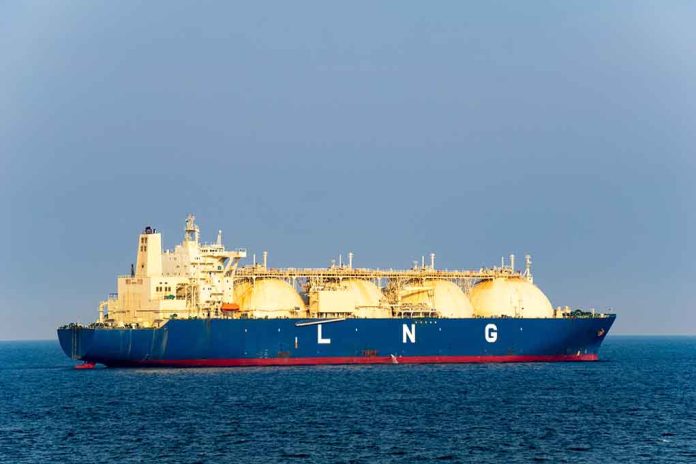
Russia has deployed warships to escort its secretive “shadow fleet” tankers through the Gulf of Finland, dramatically escalating tensions with NATO allies and marking an unprecedented militarization of commercial oil shipping routes.
Key Takeaways
- Russia has begun using naval warships to escort its “shadow fleet” oil tankers through the Gulf of Finland, a move Finland’s Defense Minister calls “unprecedented and aggressive.”
- Russian military aircraft have violated Finnish airspace amid heightened tensions over EU inspections of suspicious vessels potentially violating sanctions.
- The EU and UK have strengthened maritime regulations, prompting Russia to accuse them of “Baltic piracy” while vowing to protect its shipping interests.
- Estonia continues inspecting suspicious vessels despite a recent incident where a Russian fighter jet reportedly entered NATO airspace to prevent inspection of a Russian-bound tanker.
- Shadow fleet vessels regularly employ deceptive practices including turning off tracking systems, changing identities, and flying flags of convenience to evade sanctions.
Unprecedented Naval Escorts Raise Security Concerns
Finland’s Defense Minister Antti Häkkänen revealed that Russia has initiated military escorts for its shadow fleet tankers traversing the Gulf of Finland, marking a significant escalation in Baltic maritime tensions. These shadow fleet vessels, often operating with minimal regulatory oversight, have become central to Russia’s efforts to circumvent Western sanctions on oil exports. The vessels typically employ deceptive practices such as disabling tracking systems, frequently changing identities, and flying flags of convenience to mask their operations and cargo origins.
“Russia has begun sending military ships to escort tankers from its ‘shadow fleet’ in the Gulf of Finland. There has always been a Russian military presence in the region… But what’s new in the current situation is that Russia is now escorting commercial tankers from its shadow fleet through the narrow waters of the Gulf of Finland. This involves warships and armed forces,” said by Häkkänen.
Adding to the growing tensions, Russian military aircraft have violated Finnish airspace, prompting Finland’s Foreign Ministry to summon the Russian ambassador for an explanation. The Gulf of Finland Border Guard is currently investigating these airspace incursions, which coincide with the introduction of these unprecedented naval escorts. These developments have put Baltic nations on high alert as they navigate this increasingly militarized maritime environment.
Baltic Confrontations and NATO Response
A particularly alarming incident occurred when a Russian fighter jet reportedly entered NATO airspace over the Baltic Sea to intercept an Estonian operation against a Russian-bound oil tanker suspected of sanction violations. NATO security sources indicated the Estonian operation was aborted due to this Russian military intervention, highlighting the dangerous escalation of force Russia is willing to employ to protect its economic interests in the region.
“The fact remains that Russia is building up its military capabilities and is an aggressive and dangerous neighbor for all of Europe,” warned Antti Häkkänen, underlining the broader security implications of Russia’s maritime tactics.
Specific shadow fleet vessels have already been involved in concerning incidents. The previously flagless tanker Argent, now renamed Blint and registered under Comoros, drifted over critical subsea cables, raising security alarms. Similarly, the LPG tanker Falcon, with a documented history of AIS spoofing, entered the Gulf of Finland while signaling a false destination – tactics typical of vessels attempting to evade regulatory oversight and sanctions.
Sanctions Enforcement and Russian Accusations
The European Commission has strengthened maritime safety regulations with new insurance reporting requirements for vessels in EU waters, allowing member states to inspect transiting vessels even if they don’t dock at EU ports. These measures specifically target Russia’s shadow fleet operations and aim to enforce the $60 per barrel price cap on Russian oil imposed by the EU and G7. Despite these challenges, Russia continues to export oil and fuel to markets in China and India through these controversial shipping channels.
Russia’s response has been defiant and accusatory. At the UN Security Council, Russian representative Vassily Nebenzia labeled Baltic states’ actions as “Baltic piracy,”
Estonia’s defense ministry has characterized Russia’s naval escorts as “dangerous and unacceptable” but remains committed to its maritime security operations. Major Taavi Karotamm confirmed: “The Estonian Navy will continue fulfilling its tasks in accordance with international law as it has done previously.”
A study by the Centre for Research on Energy and Clean Air suggests that direct sanctions on the shadow fleet may prove more effective than the price cap alone, noting a recent decrease in shadow fleet usage for Russian oil exports. This finding comes as Baltic nations, alongside other EU members, reaffirm their commitment to enforcing international maritime regulations despite Russia’s increasing militarization of commercial shipping lanes – a concerning development that threatens the stability of this crucial maritime region.



